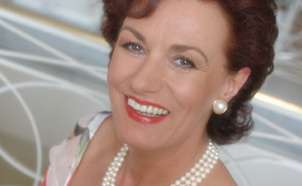|
Back
Prom 50 London
Royal Albert Hall
08/22/2009 -
Ludwig van Beethoven: Fidelio
Waltraud Meier (Leonore), Simon O’Neill (Florestan), Gerd Grochowski (Don Pizarro), Sir John Tomlinson (Rocco), Adriana Kucerová (Marzelline), Stephen Rügamer (Jaquino), Viktor Rud (Don Fernando)
BBC Singers, Geoffrey Mitchell Choir, West-Eastern Divan Orchestra, Daniel Barenboim (conductor)

Waltraud Meier (© Wilfried Hoesl)
This concert performance of Fidelio, Beethoven’s only opera, marks the 10th anniversary of the creation of conductor Daniel Barenboim and writer Edward Saďd's West-Eastern Divan Orchestra. Although Fidelio is generally a well-loved work, its choice for performance by this particular group of musicians has a special resonance and symbolism: not only was it the result of a long and bitter struggle by the composer himself – in his own words, “Of all my children . . . this is the one that causes me the most powerful birth-pangs and the most sorrows” – but the subject matter is the fight against tyranny and political injustice, and the human spirit’s capacity for love and passion for freedom. Ten years ago, at a time when Israel had severed diplomatic links with Syria and Lebanon, and tensions were growing in the Middle East, Barenboim invited music students from these regions to a workshop combining orchestral playing with intercultural exchange, complemented by lectures and discussions. There are currently musicians from Palestine, Egypt, Iran, Jordan, Lebanon, Syria, Turkey and Spain (the current host nation for the workshops), and where possible, on each desk an Arab player is paired with an Israeli. It cannot be easy for the young players to put aside political and cultural differences, but Barenboim insists that a symphony orchestra is the perfect template for democracy, involving expressing oneself while simultaneously listening intently to the voices of others, adding that he does not see his creation as an “orchestra for peace” but an “orchestra against ignorance”.
During the opera’s many revisions, Beethoven wrote four overtures, and for this performance Barenboim chose Leonore No.3 (1806). Its slow, quiet start showed an aspect of the orchestra which was to reappear many more times throughout the evening: the ability to play with a great intensity while pianissimo. The subsequent faster sections displayed an overwhelming brightness of tone and drive. The overture is full of energy and triumph, but such a triumph will be a long time coming for heroine Leonore and her political prisoner husband Florestan. In an unusual innovation, the spoken text sections of the piece were replaced by a special narration (written by Edward Saďd, the orchestra's other co-founder) in which Leonore addresses the audience directly, reflecting on the events of the day. Although the switches between English and German seemed rather odd at first, Waltraud Meier’s expressing of Leonore’s inner thoughts was actually quite effective (particularly in the absence of electronic surtitles). Of course, it was Meier’s rich, full-bodied singing voice which was the main draw to this performance, and she was magnificent throughout. Known particularly for her Wagner roles, she was unsurprisingly particularly commanding in the more dramatic sections, such as the “Abscheulicher!” aria. However, the expression and vocal acting with which Meier imbued the role throughout made it quite possible to forget that this was an unstaged concert performance. The other main delight of the performance was Adriana Kucerová’s Marzelline, sung with a lovely clear, flexible soprano which seemed to radiate sunshine.
The male singers were, on the whole, less successful in coping with the Royal Albert Hall’s tricky acoustics. Simon O'Neill was a strong Florestan with some truly ringing high notes, but a limited palette of tone colour and an intensity which to my ears sounded a little forced at times. However, his aria “Gott, welch Dunkel hier!” was elegant and moving. Sir John Tomlinson (Rocco) displayed the remains of a world-class bass voice which made a highly impressive sound at times, but was marred by lumpen, lurching phrasing and over-use of portamento. Gerd Grochowski (a late stand-in for Peter Mattei as Don Pizarro), on the other hand, sang with a pleasant tone and highly musical phrasing, but was unfortunately lacking in volume, particularly evident during the scenes with Tomlinson. Stephan Rügamer and Viktor Rud acquitted themselves respectably in the supporting roles of Jaquino and Don Fernando.
Also deserving a special mention is the chorus. Although singing for comparatively short periods, they were very impressive indeed. The slow crescendo as the prisoners emerge into the light of day was heartbreaking, and the opera's finale uplifting, sending a powerful message of strength through co-operation. This was a message reiterated by Barenboim, who ended the evening with a short speech to the highly appreciative crowd, and by the members of this amazing orchestra, overcome with emotion and hugging each other before departing the stage. Overall, a thrilling and thought-provoking evening.
Carla Finesilver
|